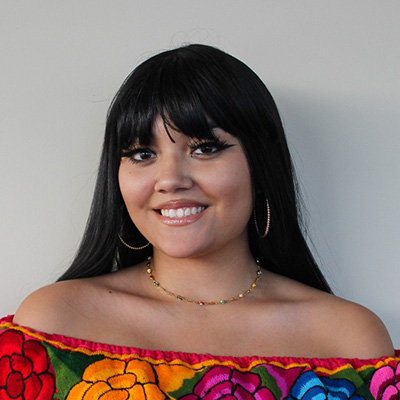

KENNESAW, Ga. | Jan 8, 2024
Villa is currently working with Dr. Paula Guerra, an associate professor of mathematics education, and Betsy Barron, a fellow undergraduate student with the same major, on ways to include culturally relevant lessons in math.
Q: What is your hometown in high school?
A: My hometown is Snellville and I graduated from Brookwood High School.
Q: What is your major in class year?
A: My major is elementary education, and I will graduate in 2024.
Q: What made you decide to come to KSU?
A: I have a dance minor and I really love the dance program at KSU, so that was a big part of why I chose to come here. The campus is also very walkable, which is a bonus.
Q: What motivated you to pursue your specific degree?
A: I’ve known I wanted to become a teacher since middle school; I always helped tutor my friends and younger students. I decided I wanted to focus on elementary school students because of the awesome second-grade teacher I had who helped me thrive even though I couldn’t speak English. She inspired me to teach because I can also give that support to students, especially my Latino students. I had my first Latino teacher last year, and I want to be that representation in the classroom.

As a teacher, I feel like it is my job to not only educate them, but to also be a beacon of support for them.
Brenda Villa
Elementary Education Major
Q: What research are you working on right now?
A: I'm doing undergraduate research for how to do culturally relevant lessons in math. I am specifically teaching symmetry using the Central and South American cultures such as the Aztecs, Mayans, and Inca.
Q: Can you explain what that entails?
A: Over the summer, I worked at the Fast Start Academy, which is held at KSU. The Fast Start Academy is a month-long summer camp where students who don’t have the best scores or need extra help can come and learn, and a lot of our students ended up being Latino. While I wasn’t one of the teachers working with literacy, I did have the opportunity to teach them math and I decided to try to give them a lesson that they could relate to somehow.
I had the students tell me where they were from and even had them mark the place they call home on a map. After seeing where everyone was from, I decided that using the Aztecs, Mayans, and Inca would be beneficial as many of the students were from around the same regions as these empires. I showed them videos of dances, agriculture, and especially pottery and art. Using the pottery, I explained the concept of symmetry and how each side must match perfectly, and they understood that. So, then I had the students do their own symmetrical drawings, and the results were fantastic. Not only did they understand enough to apply the knowledge, but they could explain it as well.
Q: What would you say your greatest challenge has been regarding research?
A: Collaboration with parents can be difficult sometimes, especially since there is often a language barrier. It can be hard to explain what their student is signing up for and what the studies we’re doing are.
Q: Why do you feel that your research is important?
A: I feel like my research is important because we can make lessons that are culturally relevant throughout all subjects. By connecting their learning to their cultures, they have a better chance of grasping and understanding the content before applying it.
Q: What would you say has been your greatest success?
A: My greatest success must be seeing the results of my undergraduate research. Even though we’re still analyzing the data, we can see a high level of progress with the students' understanding of the material and being able to elaborate on why they made the choices that they did.
Q: What is your favorite thing you've learned through this?
A: I've learned that I love to build relationships with my students. I love to learn more about their backgrounds, how they were raised, what they do in their free time. I've learned that I want to be that teacher that attends at least one of their extracurricular events, like sports events or orchestra concerts. As a teacher, I feel like it is my job to not only educate them, but to also be a beacon of support for them.
Q: What do you want to do after you graduate?
A: I really want to be an elementary school teacher, and I will eventually get my PhD. Then, I think I’d like to become a professor at KSU.
Q: What advice would you give to students who may be curious about getting involved in research?
A: Don’t be afraid. As long as you have passion for what you do and a want to inspire others to follow that same path, take a leap and then sure enough you will be the one to guide more people to do the same.
— Alyssa Ozment
Photo submitted